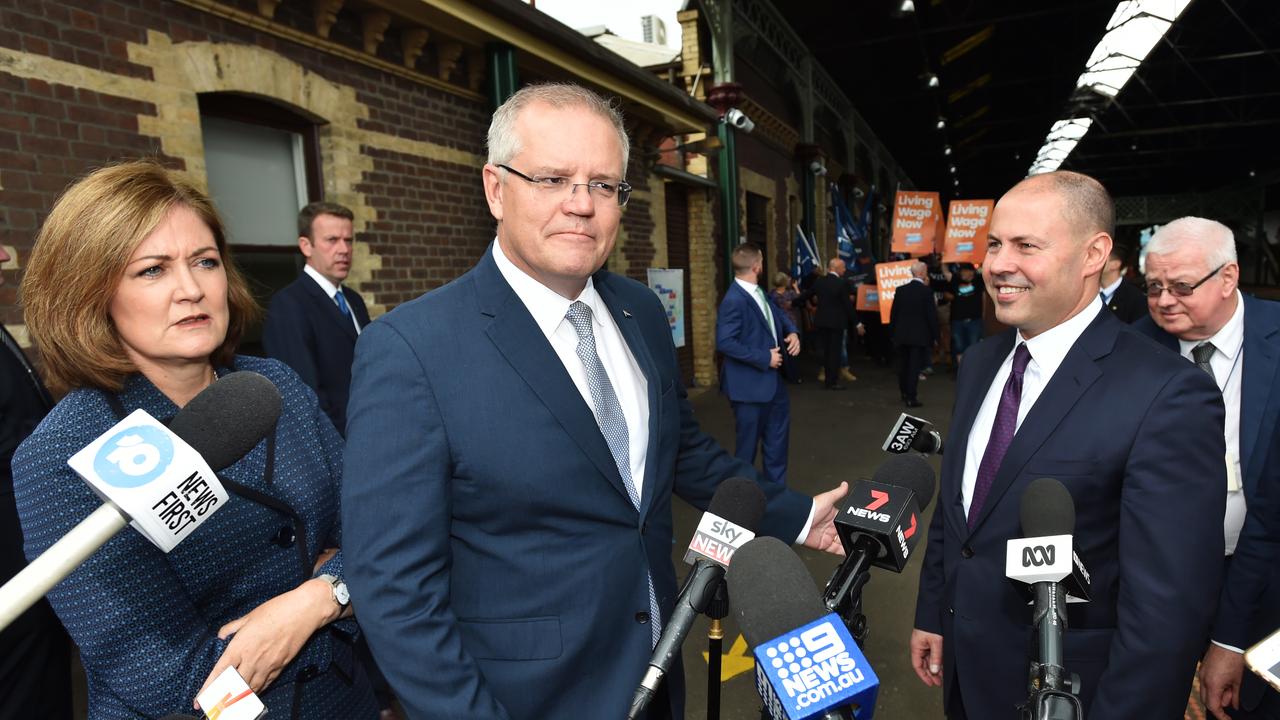Toughened tax laws take a bite from tech giants
The four biggest US tech giants paid an extra $380 million tax last year in the wake of tough new tax-avoidance laws.

The four biggest US tech giants paid an extra $380 million tax last year in the wake of tough new tax-avoidance laws introduced by the Turnbull government, although concerns remain money is still slipping through the net.
Facebook, Google, Apple and Microsoft — increasingly under the microscope of tax authorities around the world — paid a combined $616m in tax in the most recent financial year, up 160 per cent from a year earlier, according to their latest accounts.
The figures arrive at a crucial time for the government, which is trying to legislate a cut in corporate tax to 25 per cent for all businesses while demonstrating that new powers to curb corporate tax avoidance are working.
Separate figures out this week showed the tax-avoidance crackdown — in particular the Multinational Anti-Avoidance Law, which took effect in 2016 — has raised an extra $2.7 billion from multinational corporations.
“The law was really aimed at non-resident firms who sell directly to Australian customers, especially in the digital-services area,” KPMG tax expert Peter Madden said.
“The concern was these firms have significant presence in Australia, where all the negotiations and client relationships would be, but the actual sales revenue was going offshore.”
Analysis of the big four’s accounts by The Australian indicates these companies have been restructuring in a way that brings Australian-sourced revenue onshore, rather than being booked through low-tax jurisdictions such as Ireland and Singapore.

How much tax multinationals pay, especially the tech giants which in 2016 paid as little as 1 per cent of their Australian revenue in tax, has become a major political issue internationally as nations compete for investment and tax revenue in a world where sales, costs and intellectual property are more and more mobile.
One Nation leader Pauline Hanson this week effectively blocked a cut for large corporates by 5 per cent to 25 per cent on the grounds the government had not done enough to crack down on multinational tax avoidance.
Google’s accounts reveal its local revenues fell under a new accounting standard. But its receipts from customers were $3.5bn — more than five times what was reported a year earlier — after it restructured its operations to bring more revenue onshore.
Facebook restructured its operations in a similar way in 2016, resulting in a tenfold increase in revenue reported here to $327m that year. That jumped a further 46 per cent to $478.8m last year.
Microsoft’s sales for the year to June 30, 2017, jumped by almost 46 per cent to $1.05bn.
“It appears that the MAAL is working well in ensuring more revenue is booked in Australia,” University of Sydney tax expert Antony Ting said.
The improved local reporting has increased tax paid, with Google’s accounts for the year to December 30, 2017, showing income tax expense rising from $16m to $23.6m. But actual tax paid to the Australian Taxation Office was $232m, revealed in the cashflow statement and understood to be the amount paid to the ATO as the result of an audit.
A Google spokesman confirmed the restructuring was done to comply with the MAAL. “We’ve always complied with the tax laws in every country where we operate and as required by international law,” the spokesman said. “As a global business, last year we paid the majority of our approximately $US6bn total global corporate income tax in our home country, the US.”
The ATO launched a series of 318 audits against multinational companies across the technology, energy, banking, insurance and pharmaceutical industries in a bid to clamp down on widespread avoidance.
As well as booking revenue offshore, companies have been targeted for putting excessive debt into local subsidiaries or repatriating local profits via high-interest inter-company loans.
Kicking off a campaign against so-called base erosion and profit shifting in February 2012, the OECD estimated multinationals were using strategies to reduce their tax to as little as 5 per cent, against 30 per cent by smaller local companies.
But ATO figures released this week showed $2.7bn had been raised from measures against avoidance by big companies. The total figures include settlements with the ATO for audits and disputed prior-year assessments.
Hundreds of millions of dollars in extra tax claimed by the ATO have come from audits of the four tech giants. Apple Australia’s tax bill was sharply higher — $282m against $155m in 2016 — after it paid $90m to make up for “underprovision of tax for prior years”, according to its 2017 accounts.
Apple told The Australian its higher tax bill hadn’t arisen from a corporate restructure. “As new tax laws have come into effect in Australia, like the multinational anti-avoidance law, Apple has not needed to make any changes to our business model, which was and remains compliant,” local chief executive Tony King told a Senate committee last August.
Software and tablet maker Microsoft’s tax bill was up from $38m to $53m after adding $41.3m of “adjustments” for previous years.
Facebook Australia, which restructured to comply with the new MAAL, reported a $9.6m loss after its tax expense jumped to $49m from $1.9m previously. It included a settlement with the ATO for $31.2m for the years 2008 to 2016.
Despite the increased recovery, Professor Ting said there might be room for more recovery. The margin represented by Facebook’s local pre-tax profit of $32.8m was 7 per cent, compared with 50 per cent for the US publicly listed parent.
“Given our understanding of its tax structure, it is possible that a significant amount of profits is still not subject to taxation,” Professor Ting said.
Facebook confirmed in Senate hearings that revenue earned from Australian clients was still not booked here if those clients placed ads directly with Facebook on the internet.
“This is in compliance with the MAAL, suggesting that the tax law may need further improvements,” Professor Ting said.



To join the conversation, please log in. Don't have an account? Register
Join the conversation, you are commenting as Logout